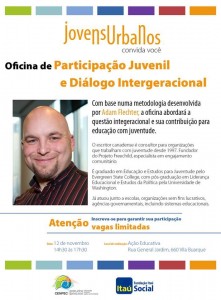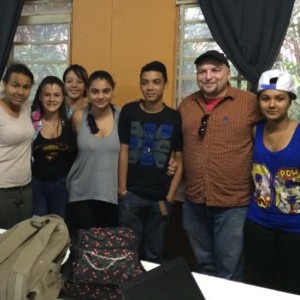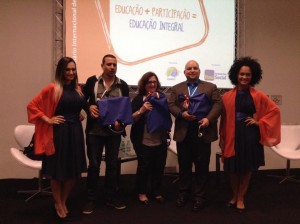
Center for Studies and Research in Education, Culture and Community Action (CENPEC) advertises November conference
Adam Fletcher ’02 is a consultant, author, and public speaker on topics including youth engagement, education policy, and community development. As a consultant, Fletcher has gotten used to “posing questions and challenging norms to which [he doesn’t] get to see outcomes.” But for eight days in November 2014, at a conference organized by the Center for Studies and Research in Education, Culture and Community Action (CENPEC), held in São Paulo, Brazil, his experience shattered that narrative. This is the story of how Adam Fletcher, a man who started his career as a youth worker at age 14, and at times lived homeless while growing up in Alberta, Canada and later in South Dakota, Montana and Nebraska, came to inspire and inform the creation of Brazil’s youth engagement programs.
CENPEC is a Brazil-based nonprofit organization, which develops initiatives to improve the quality of public education and promote civic engagement with a focus on public schools, educational spaces and policy making. The organization found Fletcher from his books, which cover topics such as youth engagement in society, discrimination against youth, and meaningful student involvement throughout the education system. Particularly since CENPEC is a philanthropic organization, Fletcher was humbled by the investment they made in bringing him to Brazil, at the time not realizing the impact his last visit in 2004 had made, when he presented at a conference focused on developing youth policies.
During this year’s dizzying eight day trip, Fletcher met inspiring community-based organizations, spoke to eight different groups, instructed in workshops with more than 300 youth and adults, was interviewed by several newspapers and television stations, and met with educators, activists and policy makers from across Brazil. Of those experiences, the most challenging may have been the workshops Fletcher facilitated on youth/adult partnerships with Programa Jovens Urbanos, a cultural program working in three cities across Brazil. Using interactive activities and working with an excellent translator, Fletcher reflected,
“The young people shared experiences from their own lives that sounded similar to what I’ve heard in my work across the United States and Canada. Whether inadvertently or on purpose, adults consistently use demeaning language, act in discriminatory ways, and generally treat children and youth in demeaning ways throughout our communities. These participants taught me that the effects of this are felt in schools, at cultural centers, throughout communities and across Brazilian society.”
Fletcher also had the opportunity to spend time in the City of São Paulo, which has over 20 million residents – about 2.5 times the size of New York City. Touring the city, he visited Campo Limpo, a low-income suburb on the city’s outskirts. However, most of his time was spent with community-based organizations. One of these organizations, Uniao Popular Mulheres, is housed at the Casa da Mulher da Crianca, a small house containing an education center, a drop-in center for children, a textile center for women in the community, a professional kitchen, a computer lab, and a community bank. At another organization, he met a group of youth who worked as program staff at the center, which reminded him of his own experience as a youth worker.
Even more impactful was Fletcher’s experience learning about The Tree School, which he describes as “one of the most dynamic, engaging educational projects I have ever learned about.” The school, which focuses on decolonizing knowledge, was founded by two organizations: Campus in Camps, an experimental educational program based in Bethlehem’s Dheisheh refugee camp in Palestine, and Brazilian-based art collective Contrafile. Learning about this school opened his eyes to “the potential for fully consensual schools that are based on non-hierarchical relationships between adults, children and youth.”
The most impactful experience didn’t come until Fletcher’s last presentation at the conference, called the Seminário Internacional: Educaçào + Participaçào = Educação Integral, where he was paired with Marcus Faustini, an education activist and community organizer from Rio de Janeiro. At the event, not only was Fletcher “credited with introducing the nation of Brazil to the concept of adultism,” but was told by one of his hosts that his reports on North American youth policy at the 2004 conference “had been used nationwide to inform the creation of youth involvement policies,” and that “youth councils, youth voice training programs and other activities are now the norm in several large cities, and they are expanding in more rural areas.” In a humbling public moment for Fletcher, the conference moderator announced at the end of the session that Fletcher’s remarks “would inform policy and practice [in Brazil] for at least another decade.”
Adam Fletcher earned his Bachelor Degree from Evergreen when he was 27, focussing on youth studies and critical pedagogy, which he notes “continues to drive my work more than a decade later”. Fletcher didn’t start his career at Evergreen, and found the College after trying many other schools, but expands “It was a great investment for me to finish at The Evergreen State College.” Having written over five books since his last visit to Brazil, two years after graduating, it’s difficult to guess what he will accomplish in the next ten years. But, we do know one thing: Brazil will be watching.



